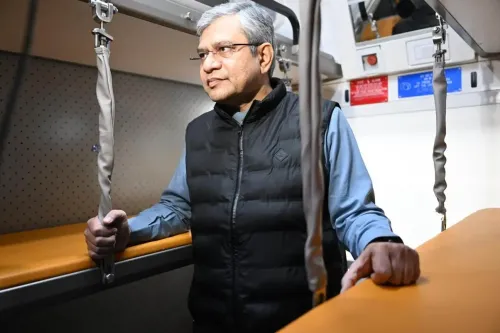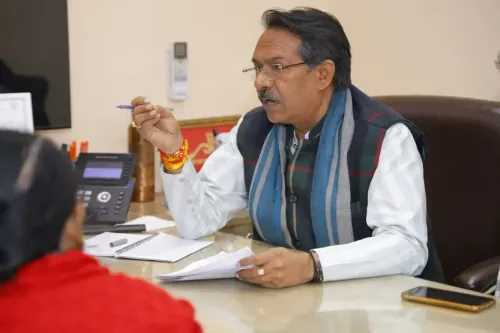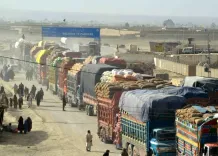Is Farhatullah Ghauri Reviving Al Ummah in South India After PFI's Decline?

Synopsis
Key Takeaways
- Al Ummah is attempting to revive its influence in southern India following the ban on the PFI.
- Farhatullah Ghauri is leading the revival efforts from Pakistan.
- The group has a history of violence and terrorist activities.
- Authorities are on high alert due to the potential threat posed by Al Ummah.
- Encrypted messaging apps are being used for recruitment and communication.
New Delhi, July 27 (NationPress) The prohibition of the Popular Front of India (PFI) has resulted in a significant void, prompting various terror organizations to seek dominance in this space. With the PFI's inability to recover, as many of its senior leaders remain incarcerated, the Al Ummah, a historic group, is gradually reestablishing its presence in the southern states.
The explosion at the Rameshwaram Cafe in Bengaluru served as a critical alert for authorities, as it bore the unmistakable hallmark of Al Ummah. Subsequent inquiries revealed that the revival efforts for Al Ummah have been entrusted to Farhatullah Ghauri, an operative operating from Pakistan.
The Al Ummah is not an unfamiliar entity in southern India. This is the same organization that attempted to assassinate senior BJP leader L.K. Advani in Coimbatore in 1998. Established by Syed Ahmed Basha in the early 1990s, the group was responsible for the 1993 bombings outside the RSS office in Chennai, which resulted in the deaths of 11 individuals. Since its inception, the group has actively encouraged Indian Muslim youth to commit terror acts against pro-Hindu figures and activists.
Authorities emphasize that the revival efforts by these groups should not be underestimated. Al Ummah has had leaders who were well-regarded within the local Muslim community. The controversy surrounding Basha's funeral is an example of this.
His funeral on December 17, 2024, drew significant attention, with many questioning the need for such a grand procession. Condolences from various political figures also highlighted his influence. The event required the deployment of 2,000 personnel from the Tamil Nadu Police and Rapid Action Force for security.
At its inception, Al Ummah claimed to be founded to avenge the demolition of the Babri Masjid. Over time, it operated as smaller factions like the Base Movement, opposing the system. Members expressed dissatisfaction with Basha's conviction and the handling of the Abdul Nasar Madani case. When functioning as the Base Movement, they targeted the judiciary and law enforcement.
However, the Base Movement's efforts faltered, prompting revival plans. The organization decided to revert to the name Al Ummah, which resonates strongly in southern India.
On encrypted messaging channels, Al Ummah, under the leadership of Ghauri, 59, circulated messages indicating a time for revival, with a message titled: "Let us pledge to rebuild the Babri Masjid."
The organization has also formed a group called Sawt al Haq on the secure messaging platform Signal. Established in December 2024 after Basha's passing, this group has grown to over 150 members, indicating its rapid expansion.
The inaugural message posted read: "The Sawt ul Haq team is proud to share the story and history of Al Ummah. This initiative by Ustad Farhatullah Ghauri and the Sawt ul Haq team aims to honor the efforts, sacrifices, and valor of the Mujahideen of Al Ummah. We aspire to educate and inspire by recognizing their legacy, ensuring their story continues to resonate through generations. Our platform seeks to connect with the remarkable individuals who laid the groundwork for the battle of Ghazwa e Hind."
In addition to messages, Ghauri has shared numerous videos, including a lengthy tribute to Basha, whom he described as a true warrior who never sought mercy from adversaries. He also praised the bomber from the Rameshwaram Cafe incident.
For Al Ummah, Ghauri represents their best hope. He is radical, extremist, and possesses extensive knowledge of the southern states, having originated from Hyderabad. His journey began at the Darsgah Jihad-o-Shahadat, or the Centre for Jihad and Martyrdom. In 1995, he moved to Saudi Arabia, where he began fundraising for Al Ummah's terror operations. He has also been involved in other terror incidents, such as the Akshardham attack in 2002 and the 2005 suicide bombing at the Task Force office in Hyderabad.
This clearly indicates that Ghauri poses a significant threat, prompting agencies to monitor him closely. Intelligence agencies have alerted state police to remain vigilant regarding gatherings potentially organized by Al Ummah recruits. They assert that Jihadi groups are eager for a strong terror faction in the south, and they see Al Ummah as their answer.










